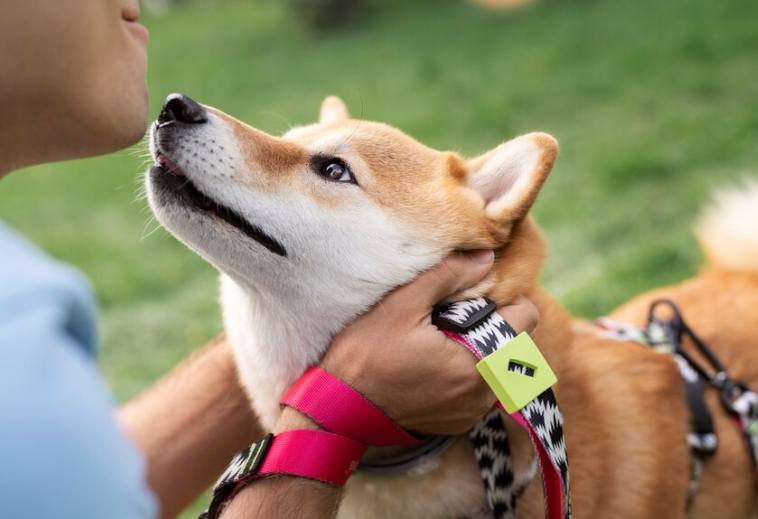
Imagine having a beloved doggo who is not only your incredible paw partner and loyal family member but also has the ability to sense when something is wrong with your health, even before you do!
Does this sound too incredible to be true? It’s actually completely realistic, and medical alert dogs are the perfect example of that!
These dogs can detect changes in their owner's body, such as changes in their scent or behavior, and alert them to the onset of medical episodes. The support they provide can be life-saving!
Medical alert dogs play a crucial role in improving the quality of life for many individuals with various health conditions, which is why today, we’ll explore a bit deeper what these dogs can detect and how they make a real difference in people's lives!
What Are Medical Alert Dogs?
Medical alert dogs are specially trained to detect physiological changes in a person’s body scent that indicate the onset of a medical episode before symptoms become obvious. These dogs rely on scent cues rather than just behavioral or emotional changes.
They provide life-saving assistance by alerting their owners to potential medical emergencies before they occur. This helps individuals take precautions, such as taking medication, going to a safe space, asking a family member for assistance, calling 911, etc.
The alerting types of behavior can be different based on the person’s needs and often include giving a kiss, nose-nudging, and pawing.
Medical alert dogs undergo specialized training, starting with basic and advanced obedience, progressing to scent training and alerting behaviors, and finishing with public access manners.
By detecting changes in odor, during episodes, medical alert dogs can offer invaluable support for individuals with a variety of conditions.
As a next step, let’s explore the types of medical episodes these dogs can detect!

What Can Medical Alert Dogs Detect?
Common medical conditions that medical alert dogs can assist with are:
Seizures
Seizures are caused by abnormal electrical activity in the brain and can result in convulsions, loss of consciousness, or unusual behaviors. Epileptic seizures, in particular, may occur unpredictably. However, it’s important to note that for medical alert dog training to be most effective, episodes should build slowly and not strike abruptly and randomly. Otherwise, the dog may have difficulty picking up on the cues.
Medical alert dogs trained for seizures can detect changes in their owner’s scent (also behavioral patterns) before a seizure occurs. By sensing the impending onset, they can alert the person or caregivers, giving them time to find safety or take precautions.
Diabetes (Hypoglycemia and Hyperglycemia)
Medical alert dogs for diabetes are trained to detect changes in blood sugar levels. They can alert their owners when their blood sugar is too high (hyperglycemia) or too low (hypoglycemia), giving them enough time to take action, such as taking insulin.
Cardiac Issues
Some medical alert dogs are trained to detect changes in their owner's scent due to fluctuations in heart rate. These dogs can alert their owner or those nearby when a potential heart attack or arrhythmia (irregular heartbeat) is occurring.
Most common cardiac conditions that medical alert dogs can alert to are:
- Heart Attacks (Myocardial Infarction);
- Arrhythmias (Irregular Heartbeats);
- Congestive Heart Failure (CHF);
- Cardiac Arrest;
- Tachycardia (Rapid Heart Rate);
- Bradycardia (Slow Heart Rate);
- Aortic Aneurysm;
- Pericarditis (Inflammation of the Heart’s Lining).
Kidney & Liver Failure/Disease
Kidney and liver diseases can be caused by infections, autoimmune conditions, genetic disorders, toxins, or chronic illnesses like diabetes and high blood pressure. Symptoms often include fatigue, nausea, swelling, confusion, and in severe cases, a buildup of toxins in the blood that alters body odor.
During acute episodes, such as hepatic encephalopathy (from liver failure) or uremic crisis (from kidney failure), metabolic changes can lead to distinct scent variations.
In the context of medical alert dog training, dogs may be trained to detect these odor changes before a crisis occurs, which allows their handler time to seek medical help.
However, because kidney and liver diseases progress gradually and acute crises don’t occur frequently, scent training can be challenging. Some handlers use samples collected during past episodes to train dogs to recognize these emergencies.
While not as common as diabetic or seizure alert dogs, some medical alert dogs have successfully detected early warning signs of toxin buildup before severe symptoms appear.
Allergic Reactions (Anaphylaxis)
Allergic reactions, such as anaphylaxis (a severe, and potentially life-threatening allergic reaction that occurs rapidly after exposure to an allergen), occur when the body’s immune system overreacts to a trigger, like certain foods or insect stings.
Symptoms can include swelling, difficulty breathing, and a drop in blood pressure. Medical alert dogs trained for anaphylaxis can detect subtle changes in their handler's body odor when an allergic reaction begins.
These dogs can alert the individual to take action, such as using an EpiPen or seeking emergency medical assistance before the reaction becomes life-threatening.
Adrenal Insufficiency (Addison’s Disease and Adrenal Crisis)
This is a medical condition in which the adrenal glands do not produce enough cortisol and aldosterone. Common causes are autoimmune disorders, infections, or damage to the adrenal glands.
Symptoms often include fatigue, low blood pressure, dizziness, nausea, and, in an adrenal crisis, severe dehydration, confusion, and shock.
Adrenal insufficiency can lead to changes in body odor, particularly during an adrenal crisis. The hormonal imbalances and metabolic disturbances associated with cortisol deficiency can alter a person’s scent. With that being said, a medical alert dog can be trained to detect these scent changes before a crisis occurs, so that their handler has time to take medication or seek help promptly.
However, training requires access to scent samples from actual adrenal crises to teach the dog to recognize and respond to these changes.
Since an individual would feel too unwell to collect scent samples, they can ask a family member, friend or caregiver to collect samples if a crisis occurs. They should be trained in advance on how to properly gather and store the samples. Furthermore, before a crisis, the individual can regularly wear sterile gauze or cotton pads in areas with high sweat production (e.g., armpits, neck, or wrists). If a crisis occurs, someone can immediately seal the used materials in an airtight container or freezer bag.
If the individual is hospitalized due to an adrenal crisis, they can request that a nurse or doctor help collect a sample.

Are There Other Types of Alert Dogs?
While medical alert dogs focus on detecting changes in body scent related to medical conditions—such as seizures, blood sugar fluctuations, or heart issues—there are also other types of alert service dogs that are not specifically trained as medical alert dogs. They can still detect the onset of various health conditions through association with the condition alone or recognizing certain behavioral patterns (“tells”).
Psychiatric Service Dogs (PSDs)
PSDs help individuals with mental health conditions, such as anxiety, depression, PTSD, and other psychiatric disorders. They can be trained to alert their owner to signs of an impending episode, such as panic attacks, anxiety, nightmares, or dissociation. They may also perform tasks like providing deep pressure therapy, guiding their owners to an exit or preventing potentially harmful behaviors.
Hearing Alert Dogs
These dogs are trained to alert their owners with hearing impairments to important sounds, such as doorbells, alarms, sirens, or a baby crying. They help the individual remain aware of their surroundings in ways that they might not otherwise be able to.
Mobility Assistance Dogs (Environmental Alerting)
While primarily assisting with physical disabilities, these dogs may also alert their handlers to environmental hazards.
For example, they can warn their owners with vision impairments or balance issues about potential dangers or block them from stepping into the street if they detect an oncoming car.
While these service dogs are trained to alert, they are not classified as medical alert dogs because they do not detect physiological changes through scent.
Migraine Alert Dogs
Migraines are intense, throbbing headaches often accompanied by nausea, sensitivity to light, and vomiting. They are not typically associated with significant or distinctive changes in body odor like some other conditions, such as diabetes or kidney failure, where a detectable scent change occurs.
However, some people with migraines may experience changes in their body odor due to factors like dehydration, nausea, or medication side effects during a migraine episode. While not as distinct as blood sugar fluctuations or seizures, some dogs may pick up on these changes.
A person might also show pre-migraine symptoms (the so-called ‘tells’), such as rubbing their temples, squinting, or changes in posture. Dogs can be trained to recognize these repetitive actions. Before a migraine, some people experience aura symptoms like dizziness, confusion, or light sensitivity. A dog may learn to recognize these symptoms and alert their owner to the onset of a migraine episode.
According to the National Library of Medicine, “Migraine is a leading cause of disability in the United States. For a subset of people who have it, migraine can develop into a chronic condition, causing even more frequent pain, discomfort, and disruption to daily life.

Can All Dogs Become Medical Alert Dogs?
Not all dogs can become reliable medical alert dogs, but many can if they have the right temperament for the job and undergo proper training. Certain physical features can also play a crucial role. Let’s explore some essential factors that can help you determine whether a dog has potential to become a reliable medical alert dog:
Health
To become a service dog, including a medical alert dog, a canine should be in good physical health, with no underlying medical conditions that could limit their ability to perform specific tasks for their owner with a disability/health condition. Since service dogs need to accompany their owners in various environments and be on duty for long periods, being physically fit is essential.
Temperament
Medical alert dogs and service dogs, in general, need to be calm, people-oriented, confident, and focused. They should not be overly excitable, aggressive, or easily distracted.
Dogs that are naturally attentive, patient, and eager to please their owners are typically favored for service dog work.
Trainability
Not all dogs have the temperament or intelligence required for the specialized training needed to become a medical alert dog. Dogs that are quick learners, enjoy problem-solving, and respond well to training tend to do better in these roles.
Scent Detection Ability
Some dogs, especially long-muzzled breeds, such as the Poodle, Border Collie, German Shepherd, Labrador Retriever, Golden Retriever, and Belgian Malinois, have a large number of olfactory receptors which helps them detect shifts in the body odor more easily and respond quickly.
While dogs are known for their great sense of smell, some are particularly gifted in this area, which is crucial for detecting medical episodes.
Socialization & Training
A medical alert dog must be able to interact appropriately with different people, and animals, in various situations and environments. They should be comfortable in public spaces without becoming overwhelmed or anxious.
Since alerting an individual to a medical episode can be life-saving, it’s crucial for these dogs to stay focused on their owner, especially in environments with distractions. Dogs that are overly distracted or reactive to their surroundings may struggle with this role.
Early socialization and consistent training are key factors for success.
Suitable Breeds for Medical Alert Dog Alerting
As listed in the previous paragraph, a dog needs to possess certain characteristics to become a reliable service animal, especially for medical alert work. We will list several breeds that are commonly used as medical alert dogs. However, remember to evaluate each dog as an individual and trust your gut when opting for your future service dog.
Labrador
Retriever
Labradors are known for their keen sense of smell, friendly demeanor, and high intelligence. Their ability to stay calm and focused makes them one of the top choices for service and medical alert dog training.
Golden
Retriever
Similar to Labradors, Golden Retrievers are highly trainable and possess an excellent sense of smell. They are also gentle and compassionate, making them ideal companions for individuals with medical conditions requiring alerts.
German
Shepherd
German Shepherds are intelligent, energetic, and versatile. Known for their excellent training capabilities, they are often used in various service dog roles, including medical alert tasks.
Border Collie
Border Collies are an excellent breed for service and medical alert dog work! They are intelligent, have a strong work ethic and have the ability to learn quickly. Border Collies excel in various tasks, including alerting to medical conditions. After all, they are also considered the most intelligent dog breed!
Poodle
Standard Poodles are known for their intelligence and excellent sense of smell. Their hypoallergenic coat is an additional benefit for people with allergies, making them a suitable choice for many medical alert tasks.
Belgian
Malinois
Belgian Malinois dogs are highly intelligent and have an exceptional sense of smell, which makes them ideal for tasks like medical alerting. They are often used in high-security roles but are also excellent service dogs.
Cocker
Spaniel
Cocker Spaniels are often used for their ability to alert to medical conditions like seizures and low blood sugar levels. They have an excellent sense of smell and are known for their good temperament.
Collie
Collies
are intelligent, alert, and have a strong desire to please. They can
be trained to detect specific medical conditions, such as seizures or
drops in blood sugar levels.










